Disagreement over a West Side house plays out following tax foreclosure hearing

YOUNGSTOWN
A group of West Side residents hopeful that a house they consider a nuisance would transfer into possession of the Mahoning County Land Bank saw its hopes dashed after a last-minute redemption kept the property in the hands of its current owners.
It’s a scenario that has played out many times before: The county moves to foreclose on a property – oftentimes vacant properties with absent owners, but not always – and the property owner makes a deal to either pay the back taxes or establish a payment plan.
Though the system is meant to ensure that individuals have options to negotiate with the county and forestall the loss of their homes in the event they owe back taxes, the system is indiscriminate in the home- owners they protect.
The owners of 345 S. Hazelwood Ave., New York-based Canus Investments, use the home as a rental property. The investment group reached an agreement with the county in September to address its $3,258 in delinquent taxes.
The house has sat vacant for more than a year, however, and neighbors want to see something happen with the structure.
Carl Rumbalski, who lives near the home, said that odors coming from the property suggest something got inside and died there.
Another resident, wishing to remain unidentified, snapped a photo of a large portion of a tree that fell during a storm in a way that obstructed a portion of the sidewalk.
The house was targeted by the Youngstown Neighborhood Development Corp.’s Rocky Ridge Neighborhood Action team as a problem property it wished to acquire and rehabilitate, but the agreement means it will stay in the hands of its current owners.
Scott Essad, a local lawyer representing Canus Investments, said the company is not an absentee landlord, but simply has had difficulty in finding a renter for the house.
“It’s a vacant house in the process of being rehabilitated. For as long as Canus has owned it, they’ve taken care of it, rehabbed inside and out and maintained the lawn. It’s never been cited by the city’s code enforcement, and Canus paid for the branch that fell to be removed,” Essad said. “We’d love for it to be rented, but because of the abundance of rental properties in the city and surrounding areas sometimes it’s just not possible.”
There are no obvious signs of neglect outside of the house — certainly nothing similar to the level of disrepair common to houses owned by absent slum lords or those that are outright abandoned — but Essad’s claim that the house has never been on the wrong side of code enforcement does not seem to be accurate.
City records show that the property is currently classified as “non-compliant” after an Oct. 4 exterior inspection by a Youngstown code enforcement officer.
Though Canus Investments and the neighbors may disagree with the quality of care at the structure, it seems both would agree that the best-case scenario would involve a new tenant moving into the building.
 43
43
